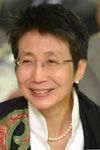Helen Siu
Courses
ANTH 342, EAST 346
Cultures and Markets in Asia
Historical and contemporary movements of people, goods, and cultural meanings that have defined Asia as a region. Reexamination of state-centered conceptualizations of Asia and of established boundaries in regional studies. The intersections of transregional institutions and local societies and their effects on trading empires, religious traditions, colonial encounters, and cultural fusion. Finance flows that connect East Asia and the Indian Ocean to the Middle East and Africa. The cultures of capital and market in the neoliberal and postsocialist world.
ANTH 362
Unity and Diversity in Chinese Culture
An exploration of the Chinese identity as it has been reworked over the centuries. Major works in Chinese anthropology and their intellectual connections with general anthropology and historical studies. Topics include kinship and marriage, marketing systems, rituals and popular religion, ethnicity and state making, and the cultural nexus of power.
ANTH 414, EAST 417
Hubs, Mobilities, and World Cities
Analysis of urban life in historical and contemporary societies. Topics include capitalist and postmodern transformations; class, gender, ethnicity, and migration; and global landscapes of power and citizenship.
ANTH 415
Culture, History, Power, and Representation
This seminar critically explores how anthropologists use contemporary social theories to formulate the junctures of meaning, interest, and power. It thus aims to integrate symbolic, economic, and political perspectives on culture and social process. If culture refers to the understandings and meanings by which people live, then it constitutes the conventions of social life that are themselves produced in the flux of social life, invented by human activity. Theories of culture must therefore illuminate this problematic of agency and structure. They must show how social action can both reproduce and transform the structures of meaning, the conventions of social life. Even as such a position becomes orthodox in anthropology, it raises serious questions about the possibilities for ethnographic practice and theoretical analysis. How, for example, are such conventions generated and transformed where there are wide differentials of power and unequal access to resources? What becomes of our notions of humans as active agents of culture when the possibilities for maneuver and the margin of action for many are overwhelmed by the constraints of a few? How do elites—ritual elders, Brahmanic priests, manorial lords, factory-managers—secure compliance to a normative order? How are expressions of submission and resistance woven together in a fabric of cultural understandings? How does a theory of culture enhance our analyses of the reconstitution of political authority from traditional kingship to modern nation-state, the encapsulation of pre-capitalist modes of production, and the attempts to convert “primordial sentiments” to “civic loyalties”? How do transnational fluidities and diasporic connections make instruments of nation-states contingent? These questions are some of the questions we immediately face when probing the intersections of culture, politics and representation, and they are the issues that lie behind this seminar.
ANTH 515, EAST 515
Culture, History, Power, and Representation
This seminar critically explores how anthropologists use contemporary social theories to formulate the junctures of meaning, interest, and power. It thus aims to integrate symbolic, economic, and political perspectives on culture and social process. If culture refers to the understandings and meanings by which people live, then it constitutes the conventions of social life that are themselves produced in the flux of social life, invented by human activity. Theories of culture must therefore illuminate this problematic of agency and structure. They must show how social action can both reproduce and transform the structures of meaning, the conventions of social life. Even as such a position becomes orthodox in anthropology, it raises serious questions about the possibilities for ethnographic practice and theoretical analysis. How, for example, are such conventions generated and transformed where there are wide differentials of power and unequal access to resources? What becomes of our notions of humans as active agents of culture when the possibilities for maneuver and the margin of action for many are overwhelmed by the constraints of a few? How do elites—ritual elders, Brahmanic priests, manorial lords, factory-managers—secure compliance to a normative order? How are expressions of submission and resistance woven together in a fabric of cultural understandings? How does a theory of culture enhance our analyses of the reconstitution of political authority from traditional kingship to modern nation-state, the encapsulation of pre-capitalist modes of production, and the attempts to convert “primordial sentiments” to “civic loyalties”? How do transnational fluidities and diasporic connections make instruments of nation-states contingent? These questions are some of the questions we immediately face when probing the intersections of culture, politics and representation, and they are the issues that lie behind this seminar.

